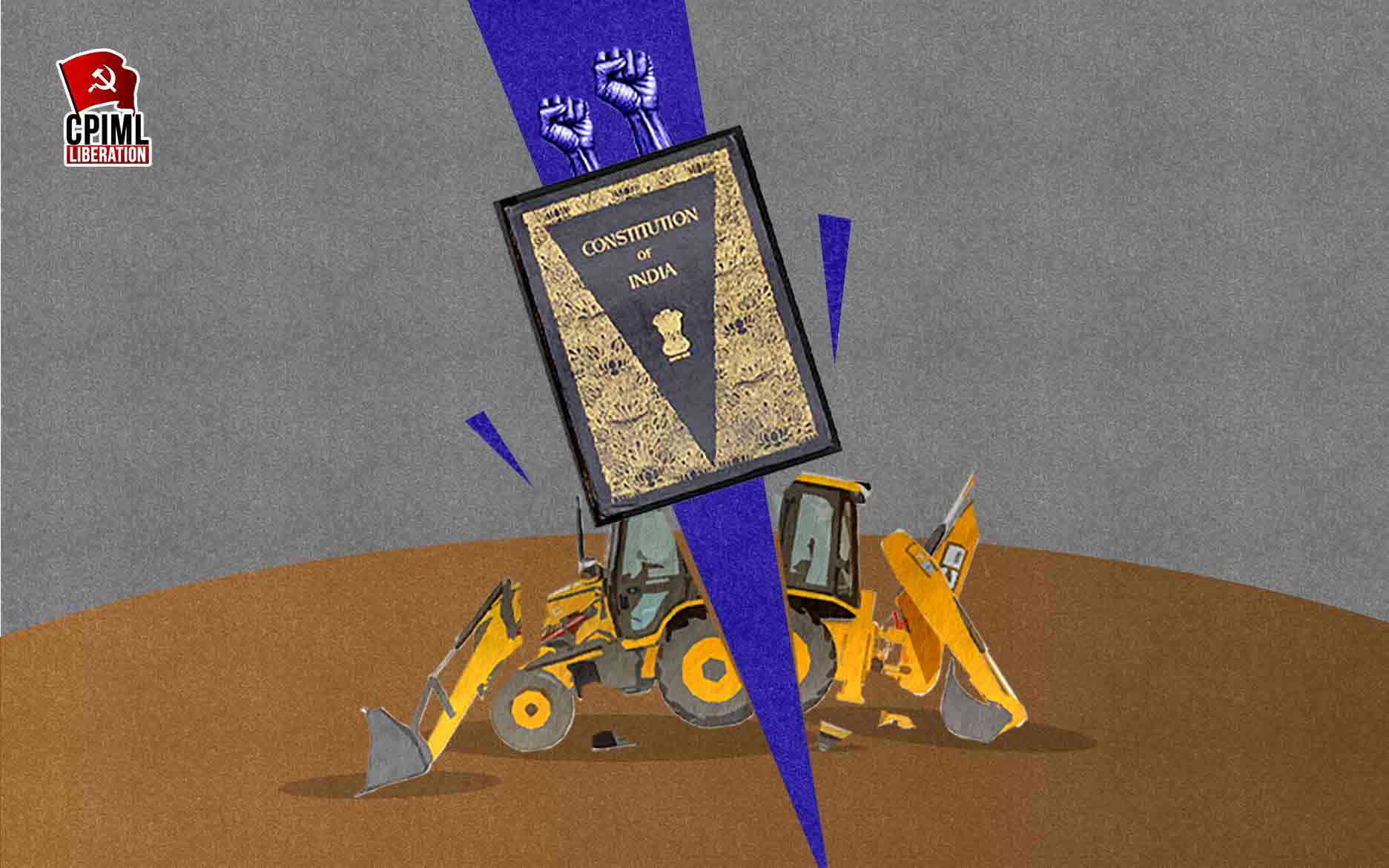Pledge on the 75th Anniversary of the Adoption of the Constitution of India: Push the Bulldozers Back

Even as the BJP propagates the paradigm of 'bulldozer raj' as a sign of 'justice' and 'strong governance', two recent judgments of the Supreme Court have come down heavily on this state-sponsored lawlessness. On 6 November a three-judge bench comprising Chief Justice DY Chandrachud and Justices JB Pardiwala and Manoj Misra imposed a punitive fine of Rs 25 lakh on the UP government for illegally demolishing the house of journalist Manoj Tibrewal Aakash in Maharajganj district in 2019. The bench found the act of the UP government totally disproportionate to the alleged scale of encroachment (3.7 square metres) and in complete violation of the due process of law. Exactly a week later came a more comprehensive indictment of the much-touted BJP template of 'bulldozer justice' when the two-judge bench of Justices BR Gavai and KV Vishwanathan termed the growing spate of demolitions mala fide and unconstitutional and laid down an elaborate set of guidelines that must be complied with to establish the legality of any demolition.
Along with mob lynching and other modes of state-sponsored orchestration of privatised violence, the extra-judicial weaponisation of the rampaging bulldozer and encounter killings has emerged as the most definitive sign of fascist terror and aggression in the Modi-Shah-Yogi era with UP as the leading laboratory of this fascist statecraft. The Supreme Court verdicts have now exposed the true meaning of this 'bulldozer model'. The illegal demolition of a house built with the lifetime savings of a family violates the fundamental right to shelter and life of a citizen. The collective punishment meted out to a family for the presumed crime of an individual inverts the basic principle of justice and amounts to usurpation of the powers of judiciary by the executive. The selective targeting of Muslims, toiling masses and dissenting citizens bulldozes the very secular democratic foundation of India's Constitution.
Even though the Supreme Court judgements do not provide any retrospective justice to the victims of the BJP's bulldozer aggression and it remains to be seen if and how the judiciary will actually enforce executive accountability to stop demolitions in the future, the verdicts have served a timely reminder to the people of India about the grave and growing threat to the core values and principles of the Constitution. The assault on the Constitution happens not just in the form of passage of explicit amendments but through policies and measures that are in brazen violation of the spirit of the Constitution. Only a few arbitrary and corrupt measures like electoral bonds may have been stopped by the judiciary while the executive has been allowed to get away with equally unconstitutional measures like demonetisation and PM Cares fund, but even the limited instances of judicial intervention should suffice to alert the people of India to the real and growing threat of subversion of the Constitution.
It is really ironic that this assault on the Constitution is intensifying at a time when we are approaching the seventy-fifth anniversary of the adoption of the Constitution (26 November, 2024) to be followed by the seventy-fifth anniversary of the foundation of the Republic and enforcement of the Constitution (26 January, 2025). The Constitution had been adopted two years after India's freedom from British colonial rule which was unfortunately accompanied by the tragedy of Partition and the trauma of unprecedented bloodshed and displacement affecting millions of people. Yet the impact of the anti-colonial movement and the dreams of an egalitarian social order were so powerful that the trauma of Partition could not cast its shadow on the Constitution. It was the RSS and the Hindutva far-right which actually got isolated with their stubborn opposition to the Constitution and its secular democratic orientation.
Today seventy-five years later the Sangh-BJP entrenched in state power and having orchestrated a rightward pro-corporate, pro-imperialist shift in India's economic and foreign policies is in a much stronger position to challenge and subvert the Constitution and trample over the rights enshrined in it. Yet even as India's weak democratic institutions are found wanting in standing up to the fascist assault, the people of India, the source of India's sovereign power have shown the potential of rallying around the Constitution to defeat the fascist offensive. If the BJP suffered a shock decline in the Lok Sabha elections right in Uttar Pradesh, the heartland of Hindutva and laboratory of bulldozer raj, the Constitution served as the pivotal point for this anti-fascist mobilisation of the people. Even during the ongoing elections to Maharashtra and Jharkhand the BJP is resorting to shocking lies and slanders to discredit the INDIA bloc's defence of the Constitution - terming it an 'urban Naxal' agenda, linking the red cover of the Constitution to China and even accusing the Congress of distributing copies of the Constitution with empty pages - thus revealing the Modi regime's deep discomfort and vulnerability on the issue. Making the fullest use of the Constitution and building the people’s struggle for the liberty and rights it espouses to defeat the fascist offensive is the best and only way of meaningfully marking the seventy-fifth anniversary of its adoption.
Charu Bhawan, U-90, Shakarpur, Delhi 110092
Phone: +91-11-42785864 | +91 9717274961 E-mail: info@cpiml.org

